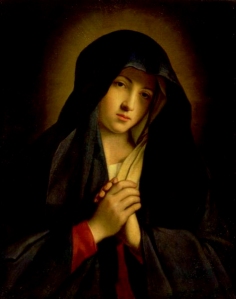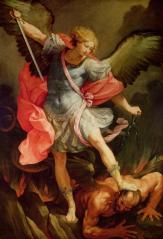
St John Chrysostom (Image: Wikimedia Commons)
We cannot Serve God and Money
In today’s Gospel, our Lord tells us what we should understand as a self-evident truth: we cannot serve two masters. Specifically, He says we cannot love God while at the same time loving money. This is not to say that money or wealth is inherently evil, however when we worship it as a god, it always leads to our doom. As St. Paul warns us, “But those who desire to be rich fall into temptation, into a snare, into many senseless and hurtful desires that plague men into ruin and destruction. For the love of money is the root of all evils; it is through this craving that some have wandered away from the faith and pierced their hearts with many pangs” (1 Tim. 6:9-10).
How often do we deny money is our god, yet our actions reveal otherwise? Whenever we desire the latest fashion, the latest electronic gadget, the newest car, the fanciest house, do we not through our very actions worship money as out god? When we seek fame and fortune for its own sake, we forsake our one and true Lord and Master.
To put it plainly: when we make money our lord and master, we are in mortal danger of banishment from the service of Christ. God is infinite and perfect love, yet true love is not easy and what we are called to return to God in love is not easy. St. John Chrysostom clearly tells us this when he writes, “I now say again to you, what I am always saying: that Christ urges His hearers to obedience to His words, both by means of what is profitable to them, and by what is painful; like a good physician, pointing out the disease that comes through neglect, and the good health that will come through obedience to His directions.”[1]
What does it profit us more as we are being eaten with the cancer of sin: to believe everything is fine and we should not trouble ourselves with it or to understand we are inflicted with a painful and deadly disease? Is it not better to know of the disease, no matter how painful, so that we might recognize it and fight it? Our Lord tells us the Truth: if we pretend there is no disease, we condemn ourselves to the fires of hell – for we must never forget that it is not God who sends us to hell, but we ourselves who do so through the actions and choices of our own free will. No, God does not send us to hell, but it is He alone who reaches out His hand in friendship and love to pull us up from the abyss of our own damnation. Without Him we have only death, but with Him we have only life.
Again, it is not wealth itself which is our enemy; it is our relationship to money which can make us master over it or slave to it. St. John Chrysostom recalls to mind here the example of Job:
Job was indeed rich. But he was no slave of mammon. He possessed riches and ruled them, as a master, not a slave. He held all he had as though he were the steward of another man’s riches. And not only did he not rob others of what belonged to them, he gave what was his to those in need…And so he did not grieve when he lost them. But the rich now are not like this, but rather in a state worse than any slave, and as though paying tribute to some tyrant. For the minds of such men become a sort of stronghold, held by money; and from there each day money sends out its commands, commands that are fulfilled by the violation of justice, and decency; and there is no one who does not obey.[2]
Our Lord implores us to take heart: “Behold the birds of the air, for they neither sow, nor do they reap, nor gather into barns: and your heavenly Father feedeth them. Are not you of much more value than they?” Now, Jesus is not calling on us to be lazy and slothful, with a “the Lord will provide” attitude; instead He reminds us that God provides all that we are and all that we ever will be. We must trust in Him for our ultimate nourishment and our ultimate life comes from a life in, through, and with the Holy Trinity.
We are called to take heart and to not lose our faith amongst the anxieties of the world: “If then God takes such care of the creatures He has made for our sake, how much more will He not provide for our own needs? If He cares for the servants, how much more will He not care for the masters? … He did not say we are not to sow, but that we are not to be solicitous. Neither did He say we were not to work, but that we must never be fainthearted, now wear ourselves out with anxieties. He commanded us to eat; but not to be over-concerned about it.”[3]
Our Lord calls us, in love, to follow Him on the difficult path: “If any man would come after me, let him deny himself and take up his cross daily and follow me. For whoever would save his life will lose it; and whoever loses his life for my sake, he will save it. For what does it profit a man if he gains the whole world and loses or forfeits himself?” (Lk. 9:23-25)
Yet, our Lord, in His infinite and perfect love, understands we cannot instantly become Christ-like. We approach Him as pilgrims on a journey, some faster and some slower than others, yet all on the same path. As we see this message in today’s Gospel, St. John Chrysostom writes of Christ’s lesson to us:
For you now however, it is enough to learn not to be grasping, that almsgiving is a beautiful thing, to know also that you must give to others a share of what is yours. If you do this well, Beloved, you will soon go on to higher things…Meanwhile therefore let us put away all excessive luxury, and be content with what is fitting and moderate; and let us learn to acquire by honest labour all we are to possess…
Therefore keeping before our mind those degrees of self discipline which have been set before us, let us strive to attain at least to those midway on the road, so that we may be delivered from the wrath to come and, drawing ever nearer, may come at last to the very crown of all blessings; and may it be given to each one of us to attain to this, by the grace and love of Jesus Christ our Lord, to Whom be glory and honour for ever. Amen.[4]
+JMJ
[1] M. F. Toal (ed), The Sunday Sermons of the Great Fathers, Volume 4 (San Francisco: Ignatius Press, 2000), 102.
Read Full Post »










Truths of the Catholic Faith
Posted in Commentary, Theology, tagged Baptism, Catholic, Eucharist, Faith, God, Hail Mary, Holy Trinity, Ignorance, Incarnation, Jesus, Lord's Prayer, Prayer, Precepts of the Church, Prenance, Redemption, Sacraments, Truths on March 18, 2012| Leave a Comment »
Image: Wikimedia Commons
From the Roman Catholic Daily Missal, 1962:
Among the truths which faith teaches us, there are several which all ought to know and believe explicitly, namely, the existence of God; the Mystery of the Holy Trinity; the Mystery of the Redemption of mankind by the Incarnation and death of Jesus Christ, and the future state of reward and punishment.
There are things which every Catholic is also bound to know by the express command either of God or of the Church. These things are: 1.) The three most ordinary Catholic prayers, namely, the Lord’s Prayer, the Hail Mary, and the Apostles’ Creed; and also, at least in substance, 2.) The Commandments of God; 3.) The Precepts of the Church; 4.) The Doctrine of the Sacraments, and especially of these three which are necessary to everyone, namely, Baptism, Penance, and the Holy Eucharist; 5.) The duties and obligations of one’s state in life.
It is a mortal sin for a Catholic to be ignorant of these things, if it be through his own willfulness or neglect.
Share this:
Read Full Post »